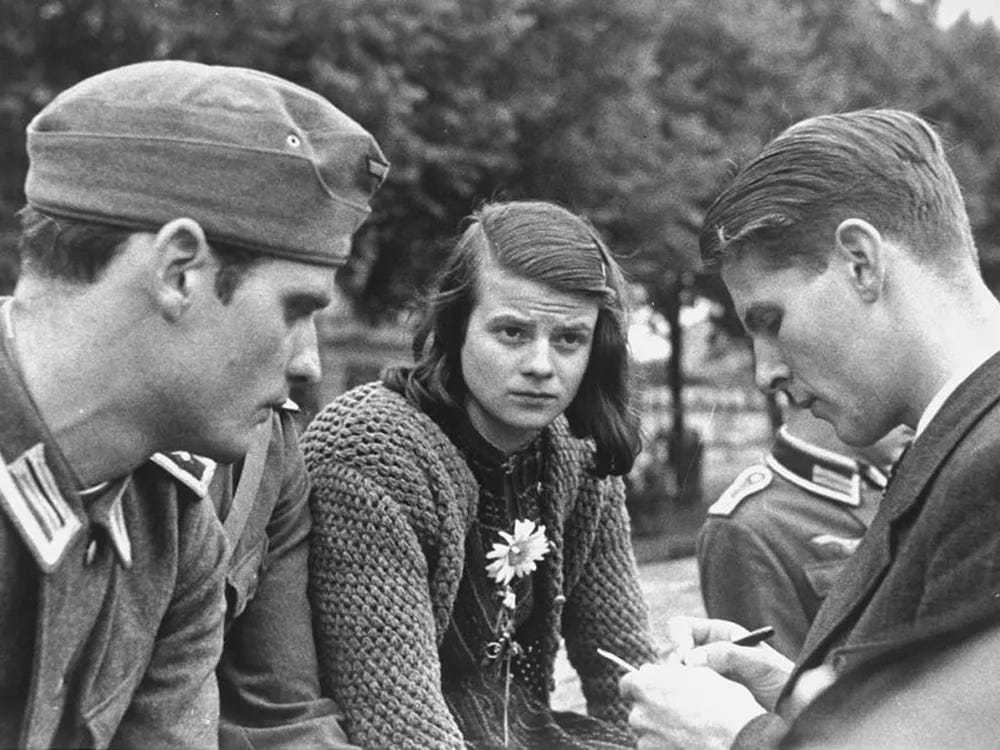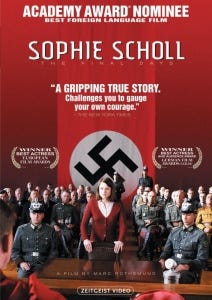W.J. Astore
Student Protest and the White Rose Movement in Nazi Germany
Apologists for the Israeli government and its genocidal policies are now warning us about “radicalized” college and university students. Apparently, it’s “radical” to protest genocide, famine, and ceaseless bombing. Contrariwise, it’s apparently “normal” to support mass murder, total destruction, and widespread starvation. Talk about a world turned upside down …
Of course, it’s only “radical” to oppose genocide if you live in a totalitarian state that’s prosecuting that genocide or aiding others in prosecuting it. Anyone with a working conscience and a smidgen of humanity would think it’s normal and sane to oppose mass murder and to protest against it.

Consider a university student who famously protested against genocide: Sophie Scholl. She, her brother Hans, and the rest of the White Rose movement in Nazi Germany are celebrated as heroes today in Germany because they spoke out at great risk against mass murder, and indeed the Nazis executed them in 1943 after holding show trials.
Again, we don’t dismiss Sophie Scholl as a campus “radical” for standing up for Jews and protesting against the murderous policies of the Third Reich. We see her as a paradigmatic individual, an example of the very best of us, a young woman of great moral courage. Of course, the Nazis thought otherwise, arresting her then executing her, her brother, and other White Rose members as traitors to their “race.”
Perhaps the Scholls were radical after all: radical in their courage and their commitment to human rights and values for all.
If you want to watch a powerful movie about young campus “radicals,” check out “Sophie Scholl: The Final Days,” from 2005. I highly recommend it. Back in 2013, I put together a list of 13 movies about the Holocaust and genocide for a college course I taught. In that course, I used well-known movies and documentaries like “Schindler’s List,” “The Sorrow and the Pity,” and “Night and Fog.” The list below was my attempt to expand on that and to point my students to some movies and documentaries that they may not have seen.
Here’s the original article I posted back in 2013:
Thirteen Movies About the Holocaust

I’ve seen a lot of movies and documentaries about the Holocaust or with themes related to the Holocaust and totalitarianism. Of the films I’ve seen, these are the thirteen that stayed with me. Please note that these movies have adult themes; they may not be suitable for children or teens.
- American History X (1998): Searing movie about neo-Nazis and the power of hate. Violent scenes for mature audiences only.
- Anne Frank: The Whole Story (2001): Excellent dramatization of Anne Frank’s life, to include the tragic end at Bergen-Belsen.
- For My Father (2008): A movie about Palestinians, Israelis, and suicide bombers, but also a movie about the difficulties of confronting and overcoming prejudice.
- Hotel Rwanda (2004): The genocide in Rwanda, and how one brave man made a difference.
- Judgment at Nuremberg (1961): Powerful indictment of Nazi war criminals after World War II.
- Katyn (2007): A reminder that the Nazis weren’t the only mass murderers in World War II.
- The Last Days (1998): Incredibly moving documentary that explores the fate of Hungarian Jews. Highly recommended.
- Life Is Beautiful (1997): It’s hard to believe that a comedy could be made about the Holocaust. But I think this movie works precisely because the main character is so resourceful and full of life.
- The Lives of Others (2006): Astonishing movie about life under a totalitarian regime (East Germany). A “must see” to understand how people can be controlled and cowed and coerced, but also how some find ways to resist.
- Lore (2012): Movie about a German teenager who has to survive in the chaos of 1945 as the Third Reich comes crashing down. Various small scenes show the hold that Hitler had over the German people, and the reluctance of many Germans to believe that the Holocaust occurred and that Hitler had ordered it.
- Sarah’s Key (2010): Heart-wrenching movie about the roundup of Jews in France, which reminds us that the Nazis had plenty of helpers and collaborators.
- Sophie Scholl: The Final Days (2005): Inspiring movie about Hans and Sophie Scholl and the White Rose movement in Nazi Germany. The Scholls were college students who took a courageous stand against the Nazis. Executed as traitors in 1943, they are now celebrated as heroes in Germany.
- The Wave (2008): Compelling movie about the allure of fascism and “the Fuhrer (leader) principle.” Highly recommended, especially if you want to know how Hitler got so many young people to follow him.


Noted with interest and complete accord with the title “It’s Not ‘Radical’ to Oppose Genocide” and the bulk of the text. But: Hmmm. I suppose I’m a doubter of the WWII Holocaust as it relates to the “accepted narrative” context that one challenges at one’s peril. If I’m permitted to paste it, I ask readers to peruse this information that I was readily given by a simple Internet search; I read the book outlined in its first edition (a guess: 2013?)…foolishly, I gave away my copy. Look for “Zyklon B” below: that was a game-changer to me; inter alia, the “fog of war” aspects that (chemist) Prof./Dr. Kollerstrom explores carried/carry great weight with me in what I consider my hair-shirt inclinations toward “intellectual curiosity…critical thinking.” Here’s the copy-paste:
Nick Kollerstrom’s book titled “Breaking the Spell: The Holocaust, Myth & Reality” delves into a controversial topic related to the Third Reich and the Holocaust. In this book, Dr. Kollerstrom challenges the widely accepted narrative surrounding the Nazi extermination policy toward Jews during World War II. (Below are) more details about the book:
Dr. Kollerstrom starts his investigation by examining forensic studies conducted in 1988 and 1991. These studies shed light on whether the claimed gas chambers at Auschwitz were used for mass murder or merely as hygienic facilities. Surprisingly, both studies concluded that Zyklon B gas was used for delousing rather than homicidal purposes, contradicting the widely accepted narrative.
The book challenges witness statements supporting the human gas chamber narrative by juxtaposing them with available scientific data. Dr. Kollerstrom argues that the Auschwitz camp authorities meticulously recorded deaths and that statistical analysis of this data does not align with the expected outcomes if the mass extermination view were true. Additionally, he highlights evidence suggesting that Zyklon B was used to improve inmates’ health and reduce camp mortality, rather than for mass murder.
Furthermore, the book explores historical context, including newspaper quotes from 1900 to 1945 that mention the threat or killing of six million Jews. Dr. Kollerstrom also discusses compensation paid to Nazi victims by Germany and implicit admissions by Israel that many million Jews survived the Holocaust. Archaeological investigations at camps like Treblinka and the amenities provided to Auschwitz inmates (such as a swimming pool, soccer games, and a hospital) are also examined.
If you’re interested in exploring alternative perspectives on this sensitive topic, “Breaking the Spell” offers a thought-provoking read. Keep in mind that this book has generated controversy and divergent opinions, so approach it with an open mind and critical thinking
LikeLike
Was the comment I submitted last night willfully/deliberately not published in this space?
LikeLike
No. I’ll check spam just in case.
LikeLiked by 1 person
Thanks. I carelessly/foolishly didn’t copy my draft submittal…as I admit (again) that it may have an aspect of controversiality.
LikeLike
Found it in spam, probably due to how it was formatted. Sorry.
LikeLiked by 1 person